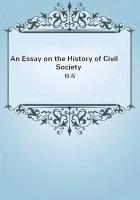Therefore despatching messengers to Antony, he desired that there might be a reconciliation, and a friendship between them. Then, drawing all his forces about the city, he made himself to be chosen consul, though he was but a boy, being scarce twenty years old, as he himself writes in his memoirs. At the first entry upon the consulship he immediately ordered a judicial process to be issued out against Brutus and his accomplices for having murdered a principal man of the city, holding the highest magistracies of Rome, without being heard or condemned; and appointed Lucius Cornificus to accuse Brutus, and Marcus Agrippa to accuse Cassius. None appearing to the accusation, the judges were forced to pass sentence and condemn them both. It is reported that when the crier from the tribunal, as the custom was, with a loud voice cried Brutus to appear, the people groaned audibly, and the noble citizens hung down their heads for grief. Publicus Silicius was seen to burst out into tears, which was the cause that not long after he was put down in the list of those that were proscribed. After this, the three men, Caesar, Antony, and Lepidus, being perfectly reconciled, shared the provinces among themselves, and made up the catalogue of proscription, wherein were set those that were designed for slaughter, amounting to two hundred men, in which number Cicero was slain.
The news being brought to Brutus in Macedonia, he was under a compulsion, and sent orders to Hortensius that he should kill Caius Antonius in revenge of the death of Cicero his friend, and Brutus his kinsman, who also was proscribed and slain. Upon this account it was that Antony, having afterwards taken Hortensius in the battle of Philippi, slew him upon his brother's tomb. But Brutus expresses himself as more ashamed for the cause of Cicero's death than grieved for the misfortune of it, and says he cannot help accusing his friends at Rome, that they were slaves more through their own doing than that of those who now were their tyrants; they could be present and see and yet suffer those things which even to hear related ought to them to have been insufferable.
Having made his army, that was already very considerable, pass into Asia, he ordered a fleet to be prepared in Bithynia and about Cyzicus. But going himself through the country by land, he made it his business to settle and confirm all the cities, and gave audience to the princes of the parts through which he passed. And he sent orders into Syria to Cassius to come to him, and leave his intended journey into Egypt; letting him understand that it was not to gain an empire for themselves, but to free their country, that they went thus wandering about and had got an army together whose business it was to destroy the tyrants; that therefore, if they remembered and resolved to persevere in their first purpose, they ought not to be too far from Italy, but make what haste they could thither, and endeavour to relieve their fellow-citizens from oppression.
Cassius obeyed his summons, and returned, and Brutus went to meet him; and at Smyrna they met, which was the first time they had seen one another since they parted at the Piraeus in Athens, one for Syria, and the other for Macedonia. They were both extremely joyful and had great confidence of their success at the sight of the forces that each of them had got together, since they who had fled from Italy, like the most despicable exiles, without money, without arms, without a ship or a soldier or a city to rely on, in a little time after had met together so well furnished with shipping and money, and an army both of horse and foot, that they were in a condition to contend for the empire of Rome.
Cassius was desirous to show no less respect and honour to Brutus than Brutus did to him; but Brutus was still beforehand with him, coming for the most part to him, both because he was the elder man, and of a weaker constitution than himself. Men generally reckoned Cassius a very expert soldier, but of a harsh and angry nature, and one that desired to command rather by fear than love, though, on the other side, among his familiar acquaintance he would easily give way to jesting and play the buffoon. But Brutus, for his virtue, was esteemed by the people, beloved by his friends, admired by the best men, and hated not by his enemies themselves. For he was a man of a singularly gentle nature, of a great spirit, insensible of the passions of anger or pleasure or covetousness; steady and inflexible to maintain his purpose for what he thought right and honest. And that which gained him the greatest affection and reputation was the entire faith in his intentions. For it had not ever been supposed that Pompey the Great himself, if he had overcome Caesar, would have submitted his power to the laws, instead of taking the management of the state upon himself, soothing the people with the specious name of consul or dictator, or some other milder title than king. And they were well persuaded that Cassius, being a man governed by anger and passion, and carried often, for his interest's sake, beyond the bounds of justice, endured all these hardships of war and travel and danger most assuredly to obtain dominion to himself, and not liberty to the people. And as for the former disturbers of the peace of Rome, whether a Cinna, a Marius, or a Carbo, it is manifest that they, having set their country as a stake for him that should win, did almost own in express terms that they fought for empire. But even the enemies of Brutus did not, they tell us, lay this accusation to his charge; nay, many heard Antony himself say that Brutus was the only man that conspired against Caesar out of a sense of the glory and the apparent justice of the action, but that all the rest rose up against the man himself, from private envy and malice of their own.
And it is plain by what he writes himself, that Brutus did not so much rely upon his forces, as upon his own virtue. For thus he speaks in a letter to Atticus, shortly before he was to engage with the enemy:















